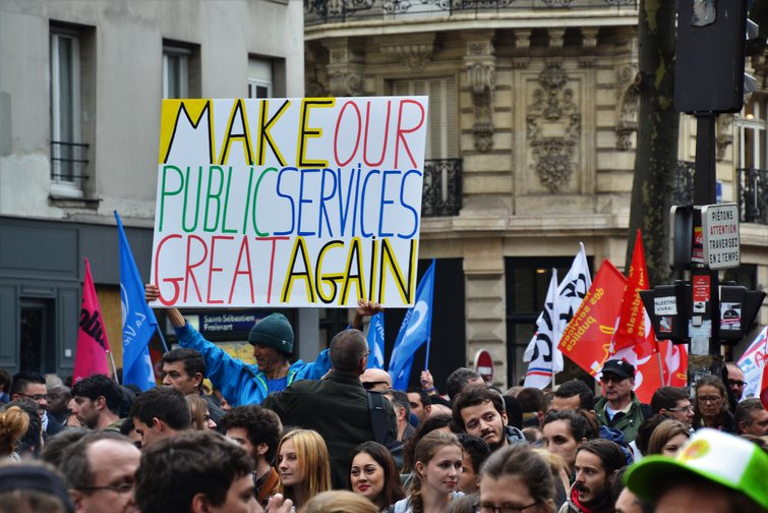In the face of climate catastrophe, mounting inequalities and growing democratic unrest, public services are more important than ever. Across the world, people are building better, more democratic and inclusive public services because privatisations are failing.
Amsterdam is confronted with challenges comparable to those facing other cities across the world, while also facing extreme pressure on affordable housing. According to a recent report, 11 percent of Amsterdam’s inhabitants are particularly vulnerable across a variety of indicators such as health, income, and education. Poorer people, relatively many of color, are pushed outside boundaries of the inner city. And while the city has ambitious environmental goals, it remains the second-largest coal port in Europe. At the same time, lower income residents are significantly more affected by environmental collapse and climate change than their wealthier counterparts. Citizens of Amsterdam are concerned about the housing market, the steep increase in tourism in the last decade, gentrification, exclusion, poverty, accessible care, climate change and energy.
Amsterdam’s municipality intends to face these challenges head-on. It has founded The99ofAmsterdam, a do- and think tank under the municipality’s Fearless program. It consists of a small team funded by the municipality. The 99 was established to connect initiatives in Amsterdam that make the city fairer, more equitable and more sustainable and inclusive. It aims to link to, and align with, international municipalist movements for inspiration. The name refers to two types of 99: the 99 neighborhoods of Amsterdam where children play on the street, and where citizens live, connect, and shop; and the 99 percent of the world, who are the vast majority of people excluded from power and who do not belong to the excessively rich 1 percent. The name thus evokes a fair Amsterdam that reflects the dreams of the 99 percent in the 99 neighborhoods of Amsterdam.
On December 4 and 5, The 99 and the Transnational Institue (TNI) organized the international conference The Future is Public: Democratic Ownership of the Economy. The conference location in the K-neighborhood in Amsterdam Southeast was deliberately chosen, as it is a diverse neighbourhood inhabited by around 50,000 people of more than 150 nationalities. This was followed by a more Amsterdam-oriented conference, the City of Tomorrow, taking place at the same venue on the 6 and 7 December, which is about granting more power to all inhabitants of Amsterdam, whether marginalised or not. It is about creating neighbourhood economies that are based on solidarity and work to benefit the people, not big corporations. It is an opportunity to get together and share inspiration, with examples from other cities and by influential thinkers such as David Harvey and Ted Howard, the founder of the Cleveland model. The conference will facilitate the exchange of ideas and generate concrete plans on how Amsterdam can become a city of change.
Amsterdam will draw inspiration from the international municipalist movement as progressive cities take the initiative to counterbalance these acute social and environmental problems in the absence of adequate action by – and often in opposition to – the policies of their central states and international institutions. In their own city, neighborhood and living environment, citizens contribute by initiating ideas, working together, uniting people and their goals for radical change. In cities like Barcelona, Naples, Paris, Berlin, New York, Montreal, Lisbon, Recoleta and others, movements have arisen that call themselves ‘municipalist’, with names such as Fearless Cities, Rebel Cities, and Transformative Cities. They share the values of democracy and solidarity, and aim to achieve fairer neighborhoods, economies based on alternative principles, better social services, and clean energy for those with lower incomes.
There is solid evidence that privatisation costs more and undermines human rights. The resistance to privatisation has turned into a powerful force for a positive cause, that of (re)municipalisation, which refers to reclaiming and creating new public services on a municipal level. The Transnational Institute and partner organisations have in their most recent research identified more than 1,400 cases of (re)municipalisation, involving over 2,400 cities in 58 countries. But ‘The Future is Public’ report is about more than just numbers. A growing international movement is on the ground, building democratic public services that are fit for the social, ecological and economic challenges of our time. (Re)municipalisation is redefining public ownership in the 21st century, offering a new route towards community-led, climate conscious and gender-sensitive public services.
Some of the most progressive municipalities – such as the Philippine cities Binalonan, Caloocan and Lanuza – are recentering their public services to prioritise the needs of the most marginalised people in society, including women, people with disabilities and low-income families, among others. While others – such as Paris, Terrassa and Wolfhagen – dare to share decision-making powers and open up ownership models to representatives of users, workers, civil society and research institutions. Together, they are shaping a template for how to expand democratic public ownership to all levels of society. The data and stories also illustrate the diversity of remunicipalisation efforts, taking us to new countries and new sectors that present their own specific challenges, such as waste management in some countries in Africa, the many new public pharmacies in Chile, and the call of the UK Labour Party to provide public internet access as a human right.
Civil society organisations, trade unions and local authorities can push in concert for democratic public ownership on all levels and call for universal public services so that all residents can lead dignified and prosperous lives. This way, we put the “public” back into public services, while actually changing the design of how our economies are run.
That said, this wave of (re)municipalisations is taking place at a critical moment. As racism, fascism and xenophobia are on the rise, we must offer solidarity and concrete solutions–decent jobs, public services for all, and resilient local economies. Our public future lies in the hands of communities – not corporations.





